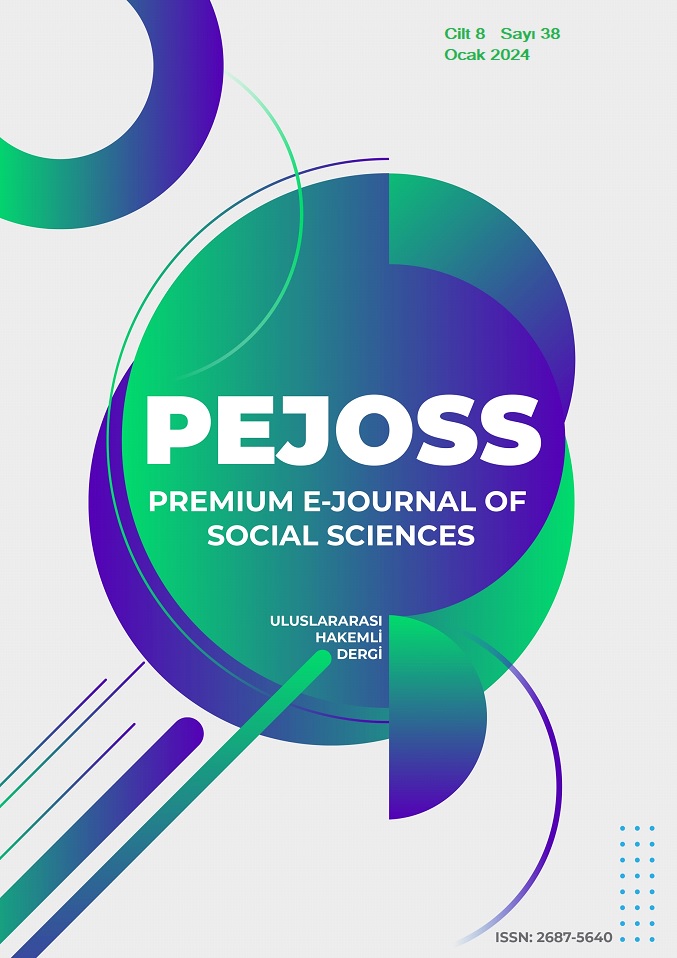The Democratic Impact Of The Slow City Movement On Local Governments
DOI:
https://doi.org/10.5281/zenodo.10627786Keywords:
Slow City, Local Government, Democracy, Globalization, Urban Quality of LifeAbstract
With the introduction of social media into our lives, the decline in the unique characteristics of societies and their resemblance to each other has shown its effect rapidly. As the borders on the world are removed, countries and cultures have become closer to each other and similar lives have started to be lived. The cultural values of countries have been replaced by easily accessible current trends. The "Slow" movement, which has become widespread around the world, has been an important step for societies that have become the same with the globalization process to preserve their cultural characteristics and to continue their traditional values. With the Slow Movement, on the one hand, the comfort of globalization that provides "convenience" is used, and on the other hand, steps have been taken to preserve the "uniqueness" of social tradition, which is the building block of cultural heritage. The "slow" movement, which emerged with the concept of globalization turning values upside down, has also brought local governments to the forefront and revealed the importance of localization in the democratic process.
Downloads
References
Akçakaya, M. S. (2022). Küçük Güzeldir: Önceliği İnsana Veren Bir Ekonomi Anlayışı. Olgu Sosyoloji Dergisi, 1(1), 41-43.
Akdoğan, Y. (2008). Yerel Siyaset-Kavramlar, Yerel Siyaset İçinde İstanbul (1.Baskı). Okutan Yayınları.
Aykaç, B. (Ed.) (2003). Türkiye'de Kamu Yönetiminin Küçültülmesi, Yerel Yönetimler ve Yerel Demokrasinin Açmazları, Gazi Kitabevi.
Aykan, E. (Ed.) (2010). Sürdürülebilir Kalkınma Bakış Açısı ile Kalkınma Ajansları ve Ekolojik Modernizasyon Uygulamalarında Kalkınma Ajanslarının Rolü, Ekin Yayınevi.
Baldemir, E., Kaşmer Şahin, T., Kaya, F., (2013). Yavaş Şehir Olma Durumunun Analitik Hiyerarşi Süreci ile Değerlendirilmesi. Ekonomi ve Yönetim Araştırmaları Dergisi, 2(1), 29-50.
Campbell, S. (1996). Green Cities, Growing Cities, Just Cities? Urban Planning and The Contradictions of Sustainable Development. Journal of The American Planning Association, 62(3), 296-312.
Clark, T. & Knowles L. (2003). Global Myopia: Globalization Theory in International Business. Journal of International Management, 9(4), 361-372.
Coşkun, A. V. (1999). Yerel Yönetimler ve Demokrasi. Türk İdare Dergisi, 71(422), 93-110.
Delal, Ö. (2019). Youtube Reklamları Üzerinden McDonald's Reklamlarının Kültürlere Göre Farklılaşması. Kritik İletişim Çalışmaları Dergisi, 1(1), 65-86.
Doğaner Gönel, F. (2010). Kalkınma Ekonomisi, (1.Baskı). Efil Yayınevi.
Ekincek, S. (2014). Sakin Şehir (Cittaslow) Yöneticilerinin Sakin Şehir Hareketine ve Sürdürülebilirliğe Yönelik Değerlendirmeleri. (Yüksek Lisans Tezi). Sosyal Bilimler Enstitüsü, Anadolu Üniversitesi.
Erdoğan, M. (2017). Anayasal Demokrasi. (13. Baskı). Siyasal Kitabevi.
Ertan, B. (2002). Yerel Yönetim Kavramı. Çağdaş Yerel Yönetimler, 11(1), 22-30.
Görmez, K. (1997). Yerel Demokrasi ve Türkiye, Vadi Yayınları.
Hill, D. M. (1974). Demokratik Teori ve Yerel Yönetim, National Library of Avustrlia.
Holden, B. (1988). Understanding Liberal Democracy, Philip Allan.
Knox, P. & Mayer H. (2006). Slow Cities: Sustainable Places in a Fast World. Journal of the Urban Affairs Association, 28(4), 321-334.
Mardin, Ş. (2020), Türkiye’de Toplum ve Siyaset: Makaleler 1. İletişim Yayınları.
Mill, J. S. (1996). Essays on French History and Historians. Routledge.
McLuhan, M. (1964). Understanding Media: The Extensions of Man. Signet Books.
Özer, M. A. (2000). Yerel Demokrasi, Demokratik Yerel Yönetimler ve Yerel Yönetimlerin Demokratikleşmesi Kavramlarının Tahlili Üzerine, Türk İdare Dergisi, 72(426), 129-143.
Özer, M. A. ve Akçakaya, M. (2014). Yerel Yönetimler. Gazi Kitabevi.
Özmen, Ş. Y., Birsen, H., & Birsen, Ö. (2016). Yavaş Hareketi: Çevreden Kültüre Hayatın Her Alanında Küreselleşmeye Başkaldırı. İnönü Üniversitesi İletişim Fakültesi Elektronik Dergisi, 1(2), 38-49.
Resnik, D. B. (2010). Urban Sprawl, Smart Growth, and DeliberativeDemocracy, Am J Public Health, 100(10), 1852–1856. doi: 10.2105/AJPH.2009.182501
Sugranyes, A. & Mathivet, C. (2010). Cities For All Proposals and Experiences Towards the Right to the City, Habitat Internatinal Coalition.
Sezgin, M. ve Ünüvar, Ş. (2011). Yavaş Şehir; Sürdürülebilirlik ve Şehir Pazarlaması Ekseninde. Çizgi Kitabevi.
Schumacher, E. F. (Ed.) (2014). Küçük Güzeldir: Önceliği İnsana Veren Bir Ekonomi Anlayışı. Simurg Kitapevi.
Şenses, F. (2004). Neoliberal Küreselleşme Kalkınma İçin Bir Fırsat mı, Engel mi? ERC Working Paper in Economic, 4(9), 1-27.
Tocqueville, A. (Ed.) (1994). Amerika’da Demokrasi, Yetkin Yayınları.
Ünal, M. ve Zavalsız, Y. (2016). Küreselleşme Karşıtı Bir Hareket: Yavaş Hareket. İnsan ve Toplum Bilimleri Araştırmaları Dergisi, 5(4), 889-912.
Yıldırım, S. (1993). Yerel Yönetim ve Demokrasi - Kavramlar, Yaklaşımlar, Iula-Emme.
Zorlu K. ve Yılmaz A. (2014). Kültürel Mirasın Korunmasında Yeni Bir Şehir Hareketi: Sakin Şehir (Cittaslow), Gençlik ve Kültürel Mirasımız Uluslararası Kongre, 1(1), 361-370.
Downloads
Published
How to Cite
Issue
Section
License
Copyright (c) 2024 Premium e-Journal of Social Science (PEJOSS)

This work is licensed under a Creative Commons Attribution 4.0 International License.


